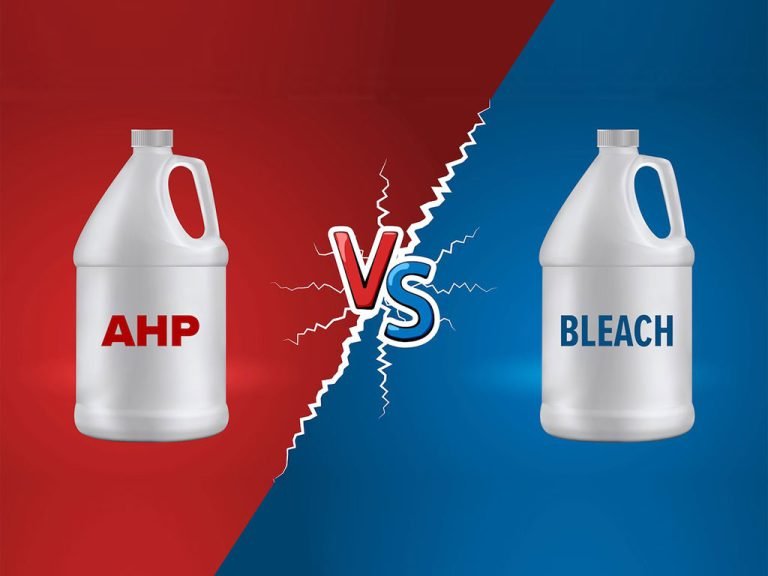Hydrogen Peroxide vs Bleach: Which One Should You Use?
Keeping a house clean is really important, and it helps with its appearance and hygiene. However, it is quite hard to pick the right kind for each task with the hundreds of cleaning products available.
The two most popular disinfectants, bleach, and hydrogen peroxide, are strong ones, with each having its advantages and disadvantages. Knowing which chemical to apply and when to avoid is important for effective cleaning and ensuring safety within your home.
In this blog, we will discuss what experts say about the pros and cons of both and share key tips about things that should never be cleaned using bleach, helping you make informed choices for your cleaning routine.
What is Hydrogen Peroxide?
Hydrogen peroxide (H₂O₂) is a chemical bonding between hydrogen and oxygen; therefore, it reacts with other chemicals. It is available at homes as a 3% solution, and due to its versatile uses, it can be purchased easily. Hydrogen peroxide, with the chemical formula H2O2, is an oxidizing agent for cleansing, stain removal, and antiseptic applied to cuts and scraped kneaded areas.
Chemical Composition and Properties of Hydrogen Peroxide
Hydrogen peroxide is a basic compound formed by two hydrogen atoms and two oxygen atoms. Its most valuable property is its capability to decompose in water with oxygen upon interaction with other materials. This breakdown makes it a strong disinfecting agent that may wipe out bacteria, viruses, and fungi.
It is weakly acidic and is available at a 3% concentration for ordinary use in the home. In cleaning or sanitizing, it functions as an oxidant that corrodes the cell walls of pathogens and disintegrates them.
Uses of Hydrogen Peroxide
Hydrogen peroxide has a wide range of applications in both cleaning and health care:
- Surface Cleaning: This is normally useful for cleaning kitchen tables, bath areas, and any other areas that may involve food preparation, such as cutting benches.
- Stain Removal: Excellent when it comes to washing cloth and carpeting and other areas that may have stains.
- First Aid: Known to be effective for washing minor wounds because of its germ-killing abilities.
- Whitening Laundry: It can be used to replace bleach for brightening whites and discharging colors.
Pros and Cons of Hydrogen Peroxide
| Pros | Cons |
| Cleans Well: Kills germs like bacteria and viruses. | Can Break Down: Loses strength when exposed to light or heat. |
| Natural Cleaner: Safe for the environment, unlike harsh chemicals. | Can Stain: It may bleach fabrics or surfaces if not carefully used. |
| Whitens: Helps whiten clothes, clean grout, and brighten teeth. | Can Irritate Skin: Strong concentrations can hurt your skin. |
| Cheap: Low-cost and easy to find. | Doesn’t Kill All Germs: Not always effective against of of kinds of germs. |
| Mild Bleach: Removes stains without the use of bleach. | Can Damage Materials: May damage rubber, plastic products, and other related materials. |
| Deodorizes: Neutralises odors by eliminating bacteria. | Short Shelf Life: This doesn’t last long after opening. |
What is Bleach?
Bleach is a chemical used for disinfection, bleaching, or stain removal. It comes as a solution in the concentration range of 5-6%, which is suitable for most household applications. Bleach kills bacteria, viruses, and fungi very easily but is also characterized by a strong nature, so handling must be executed with extreme care.
Chemical Composition and Properties of Bleach
Bleach is a strong cleaner, either sodium hypochlorite or hydrogen peroxide-based. It removes stains, germs, and other forms of surface pollution and does an excellent job of disinfecting. However, bleach is strong; thus, it can damage fabric, rust metals, and irritate skin and eyes, making a precautionary approach toward using it required. Store bleach in a cool, dark location to keep it effective.
Uses of Bleach
- Disinfecting: This is most widely used in bathroom and kitchen cleaning, as well as general contact areas such as doorknobs and light switches.
- Mold Removal: Bleach is effective in removing mold and mildew growth on surfaces.
- Laundry: It is normally used to bleach clothing, especially white items.
- Water Purification: Used to purify drinking water in emergency situations.
Pros and Cons of Bleach
| Pros | Cons |
| Kills Germs and Viruses: Tough on surfaces, removing bacteria and viruses. | Harsh Chemicals: May cause skin, eye, and respiratory tract irritation. |
| Removes Stains: Decent at tackling very difficult stains on white-colored clothes. | Can Damage Fabrics: It fades colors and causes the fabric to wear out. |
| Prevents Mold and Mildew: Facilitates mold removal in areas mostly affected by humidity. | Strong Smell: The odor can be overpowering. |
| Affordable: Inexpensive and easy to find. | Harmful to the Environment: Can pollute water and soil. |
| Brightens Whites: Enhances the look of cleanliness on white clothes and surfaces. | Not for All Surfaces: May harm certain kinds of surfaces, paints, and dyed textiles. |
Hydrogen Peroxide vs Bleach: Which is Better for You?
Hydrogen peroxide and bleach are excellent disinfectants, though their use in most areas is a feature that separates them:
Hydrogen peroxide is safer and more environmentally friendly than other similar products for general cleaning and light disinfection, especially for homes with children or pets.
Bleach is more capable and stronger for heavy-duty disinfecting or mold removal. While it is stronger and more effective for more challenging work, such as toilet cleaning, mold removal, or clothes stain treatment, it can be a bit pricey compared to some of its other alternatives.
Key Differences:
| Feature | Hydrogen Peroxide | Bleach |
| Disinfection Power | Mild to moderate | Strong |
| Health Impact | Non-toxic, safe for pets and children | Toxic fumes, harmful to skin/eyes |
| Effectiveness | Good for light tasks, breaks down over time | Highly effective, long-lasting |
| Environmental Impact | Eco-friendly, breaks down naturally | Harmful to the environment if not used properly |
| Best Use | Everyday cleaning, wound care, laundry | Mold removal, heavy-duty disinfection |
Measures to be Taken When Working with These Compounds
Hydrogen Peroxide:
- It is advisable to keep it in a cool, dry place away from heat and direct sunlight. It will break down in light.
- While cleaning, always wear gloves to avoid probably causing your skin to itch.
- It is expedient not to use hydrogen peroxide alongside vinegar or any other form of acid, as it releases dangerous fumes.
Bleach:
- When you are using bleach, always wear gloves and goggles to avoid getting harmed by bleach.
- Bleach has toxic effects on the respiratory system. Therefore, it is crucial to work with bleach when windows and doors to a room are open.
- Do not put bleach together with ammonia because the combination reacts to form toxic chloramine gases.
Precautionary Measures for Using These Chemicals
Hydrogen peroxide
- The solution must be stored in a dark cool place in order to avoid degradation.
- The chemical must not be mixed with vinegar or other acids, as harmful fumes will evaporate, posing a danger.
- Wear hand gloves when working to avoid skin irritation from its application when cleaning.
Bleach
- Gloves and eyeglasses should always be used when working with bleach
- Wear suitable ventilation to acquire properly ventilated air because bleach can cause damage to the respiratory system
- Do not mix bleach with ammonia, as this chemical creates toxic chloramine vapors.
FAQs
Which of the two will clean better, hydrogen peroxide or bleach?
Bleach is stronger and more deadly to a wider range of germs. Hydrogen peroxide cleans up well but is a little kinder, so it’s good for regular home cleaning.
Can I mix hydrogen peroxide with bleach?
No, never mix the two. Mixing hydrogen peroxide with bleach generates poisonous fumes. Apply them separately, and safety precautions are to be taken in practice.
Does hydrogen peroxide damage fabrics or surfaces like bleach?
Hydrogen peroxide fades fabrics a bit more than bleach, but it is otherwise gentler. However, it is more likely to stain or discolor things.
Which is better for laundry: hydrogen peroxide or bleach?
Bleach: Whitens, heavy staining. Hydrogen peroxide is used for colored fabric or light stain, which bleach will damage.
Conclusion
Hydrogen peroxide and bleach have their use in cleaning and disinfecting, but you should know when to use each of them. However, for general cleaning and a much safer and environmentally friendly product other than vinegar, hydrogen peroxide is preferable. However, bleach is the best option for tough cleaning chores such as disinfection or removal of mold. It is helpful to be aware of certain safety measures to use to avoid harm to the self, family, or the environment.
Cleaning supplies ensure a clean, safe, and healthy home. Whether you need everyday cleaners or disinfectants for bigger jobs, we have you covered. Visit garafour for the best cleaning products suited to your needs, along with expert tips to get the job done!
Contact us for assistance with your orders or any questions you have. We’re here to help!.
Quick Links
Contact Us
Need help with your order & returns?
support@garafour.com
returns@garafour.com
+1 214 329-9119
Warehouse Locations
- Albany, NY
- Atlanta, GA
- Baltimore, MD
- Boston, MA
- Charlotte, NC
- Chicago, IL
- Columbus, OH
- Cleveland, OH
- Cranbury, NJ
- Dallas, TX
- Denver, CO
- Houston, TX
- Kansas City, MO
- Memphis, TN
- Minneapolis, MN
- Nashville, TN
- Orlando, FL
- Phoenix, AZ
- Download Wharehouse List






